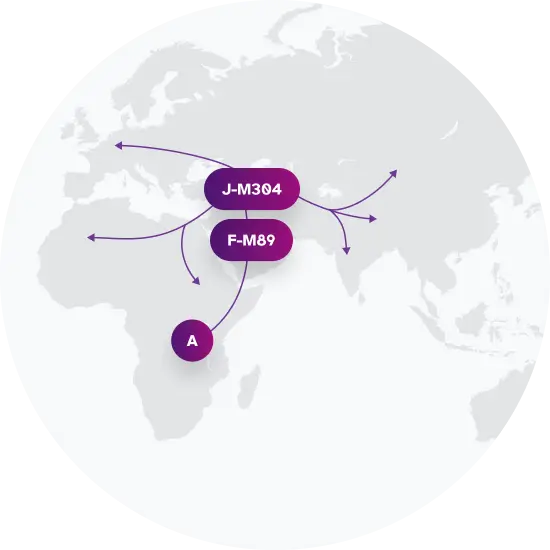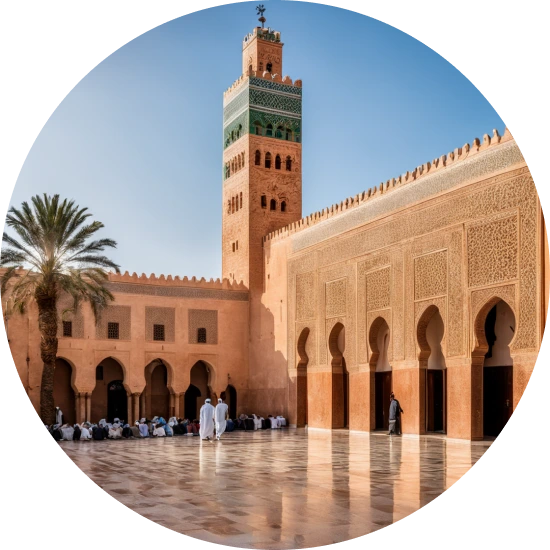Explore the Family Name Hassan
How common is the last name Hassan in the United States?
Based on data from the Decennial U.S. Census, the popularity of the surname Hassan in the United States has seen a considerable increase. In 2000, Hassan was ranked as the 2762nd most popular surname, but by 2010, it had climbed to 1652nd place, representing a significant rise of 40.19%. The total count of individuals with the Hassan surname also showed a similar increase, growing from 11,993 in 2000 to 21,801 in 2010, which is an 81.78% surge. As a result, the proportion of people with the Hassan surname per 100,000 inhabitants increased by 66.07%, from 4.45 in 2000 to 7.39 in 2010.
| 2000 | 2010 | Change | |
|---|---|---|---|
| Rank | #2,762 | #1,652 | 40.19% |
| Count | 11,993 | 21,801 | 81.78% |
| Proportion per 100k | 4.45 | 7.39 | 66.07% |
Race and Ethnicity of people with the last name Hassan
The Decennial U.S. Census data on the ethnic identity associated with the Hassan surname reveals some interesting shifts between 2000 and 2010. In 2000, the largest ethnic group associated with the Hassan surname was White, at 36.90%. However, by 2010 this figure had dropped slightly to 33.76%. There was a notable decrease in the proportion of people with the Hassan surname identifying with two or more races, falling from 19.09% in 2000 to just 4.72% in 2010. The percentage of those under the Asian/Pacific Islander category saw a slight increase from 18.58% to 19.20%. Meanwhile, the proportion of individuals with the Hassan surname identifying as Black experienced a large leap, jumping from 21.68% in 2000 to 38.95% in 2010. Small changes were observed among those identifying as Hispanic and American Indian and Alaskan Native.
| 2000 | 2010 | Change | |
|---|---|---|---|
| Black | 21.68% | 38.95% | 79.66% |
| White | 36.9% | 33.76% | -8.51% |
| Asian/Pacific Islander | 18.58% | 19.2% | 3.34% |
| Two or More Races | 19.09% | 4.72% | -75.28% |
| Hispanic | 3.53% | 3.14% | -11.05% |
| American Indian and Alaskan Native | 0.23% | 0.24% | 4.35% |
Hassan ancestry composition
23andMe computes an ancestry breakdown for each customer. People may have ancestry from just one population or they may have ancestry from several populations. The most commonly-observed ancestry found in people with the surname Hassan is Egyptian, which comprises 13.7% of all ancestry found in people with the surname. The next two most common ancestries are Northern Indian & Pakistani (11.6%) and Somali (9.5%). Additional ancestries include British & Irish, Iranian, Caucasian & Mesopotamian, Levantine, Bengali & Northeast Indian, and Sudanese.
Ready to learn more about your ancestry? Get the most comprehensive ancestry breakdown on the market by taking our DNA test. Shop 23andMe
| ANCESTRY BREAKDOWN | COMPOSITION |
|---|---|
| Egyptian | 13.7% |
| Northern Indian & Pakistani | 11.6% |
| Somali | 9.5% |
| Other | 65.2% |

Possible origins of the surname Hassan
Your DNA provides clues about where your recent ancestors may have lived. Having many distant relatives in the same location suggests that you may all share common ancestry there. Locations with many distant relatives can also be places where people have migrated recently, such as large cities. If a large number of individuals who share your surname have distant relatives in a specific area, it could indicate a connection between your surname and that location, stemming from either recent ancestral ties or migration.
Based on 23andMe data, people with last name Hassan have recent ancestry locations in the United Kingdom of Great Britain and Northern Ireland and Somalia.
| RECENT ANCESTRY Location | Percentage |
|---|---|
| Merseyside, United Kingdom | 17.50% |
| Greater London, United Kingdom | 17.50% |
| Tyne And Wear, United Kingdom | 17.30% |
| Glasgow City, United Kingdom | 17.30% |
| Greater Manchester, United Kingdom | 17.30% |
What Hassan haplogroups can tell you
Haplogroups are genetic population groups that share a common ancestor on either your paternal or maternal line. These paternal and maternal haplogroups shed light on your genetic ancestry and help tell the story of your family.
The top paternal haplogroup of people with the surname Hassan is J-CTS5368, which is predominantly found among people with European ancestry. Haplogroup J-CTS5368 is descended from haplogroup J-M304. Other common haplogroups include E-V32 and R-P311, which are predominantly found among people with Sub-Saharan African and European ancestry. Other surnames with similar common haplogroups are: Ali, Ahmed, Ibrahim, Abraham, Schwartz, Solomon, Weinstein, Osman, Hasan, Weiss.
The most common maternal haplogroups of people with Hassan surname are: H1, H, L2a1. These most commonly trace back to individuals of European and Sub-Saharan African ancestry.
 Paternal Haplogroup Origins J-M304
Paternal Haplogroup Origins J-M304
Your paternal lineage may be linked to men who spread the Semitic languages
Men carrying the J-M267 lineage took part in many waves of migrations over the millennia, and domesticated animals and plants weren't the only things they carried. They may also have been among the communities that spread the Semitic languages, a diverse group that bloomed from a single proto-Semitic tongue in the Levant nearly 5,750 years ago. These men likely carried branches of both haplogroup J and of the Semitic language family through the Arabian Peninsula to the Horn of Africa. Still later, some J-M267-bearing men re-expanded from the Arabian Peninsula back through the Middle East and across North Africa in migrations associated with the emergence and spread of Islam.
Your maternal lineage may be linked to Marie Antoinette
Because it is so dominant in the general European population, haplogroup H also appears quite frequently in the continent's royal houses. Marie Antoinette, an Austrian Hapsburg who married into the French royal family, inherited the haplogroup from her maternal ancestors. So did Prince Philip, Duke of Edinburgh, whose recorded genealogy traces his female line to Bavaria. Scientists also discovered that famed 16th century astronomer Nicolaus Copernicus traced his maternal lineages to haplogroup H.

What do people with the surname Hassan have in common?
Spoiler alert: it's complicated. People with the same last name are usually no more genetically similar than a randomly sampled group of people from the same population. That said, people with the same surname are more likely to have similar ancestries than randomly sampled individuals. The reason is the tendency of people with similar cultural or geographical backgrounds to preferentially mate with one another. That's why people who share a surname may be more likely to share traits and tendencies in common than people within the general population. Check out the percentages below to see the prevalences of tastes, habits, and traits of people with your surname compared with prevalences among 23andMe users.
Preferences
Traits
Habits
Wellness
Are health conditions linked to the last name Hassan?
The short answer is that, if there is an association between surname and health, it's usually more about your ancestry than your name. Individuals with a given surname are no more genetically similar than the general population but often have similar ancestries. The populations of people associated with those shared ancestries often have sets of genetic variations, also known as alleles, in common. Some of those alleles are associated with a greater likelihood of developing certain diseases.
Disease variant frequency by ancestry
Disease allele frequencies in populations associated with the surname Hassan are shown below. Important Note: not everyone with a disease allele will develop these health condition
























